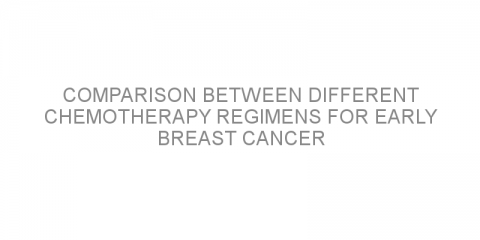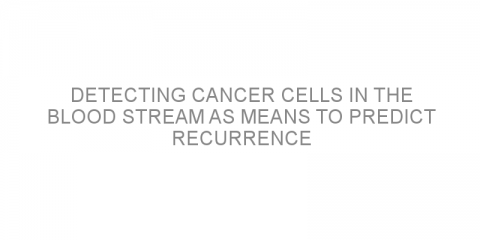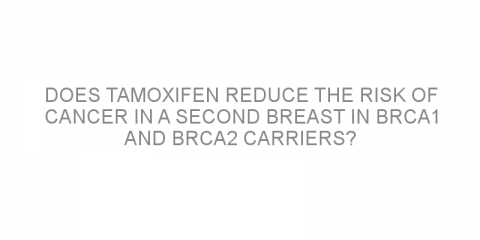In a nutshell This paper studied the impact of endocrine therapy on sexual function in postmenopausal patients with breast cancer. Some background Endocrine therapy is used in the treatment of hormone receptor positive early breast cancer. Hormone receptor positive breast cancer is cancer which has an abundant presence of the estrogen or...
Read MoreTreatment(s) already received-Radical mastectomy Posts on Medivizor
Does the chemotherapy dose schedule matter for early breast cancer treatment?
In a nutshell This study compared the safety and efficacy of three chemotherapy regimens in early breast cancer. Some background Adjuvant chemotherapy, delivered following surgical removal of the tumor, reduces mortality rates in breast cancer. Recent studies have shown that dose-density chemotherapy (which increases the intensity of the therapy...
Read MoreTiming of adjuvant chemotherapy after surgery
In a nutshell This study examined whether the timing of adjuvant chemotherapy affects survival among women with breast cancer. Some background Surgical resection to remove all cancerous tissue is the standard of care for the treatment of breast cancer. After surgery, many patients also undergo adjuvant treatments (additional therapy following...
Read MoreThe pathways followed by doctors in the diagnosis and treatment of recurring and metastatic breast cancer
This paper evaluates the process health care professionals follow to diagnose a cancer that reoccurs in the same location as a previous cancer (locally recurrent), or a cancer that has spread (metastasized). Despite earlier detection and improved treatment options for breast cancer, it is still the leading cause of cancer related deaths in...
Read MorePersonalized Tamoxifen Treatments
Most patients on Tamoxifen receive a standard dose of medication. However, patients may benefit more from individually adjusted doses. This paper highlights potential strategies for personalized Tamoxifen treatments. Tamoxifen is not active on its own. Once ingested, the body converts it into other substances (metabolites). Some of these...
Read MoreThe association between insulin blood levels and risk of death in breast cancer patients
In a nutshell The present study evaluated the relationship between high insulin levels in the blood stream and the risk of cancer-related mortality. Its authors report that women with higher-than-normal insulin levels are at higher risk of death due to breast cancer. Some background Breast cancer has been shown to be more common in people who...
Read MoreComparison between different chemotherapy regimens for early breast cancer
In a nutshell The present study compared the long-term efficacy and safety of different adjuvant chemotherapy regimens for breast cancer. Main results: chemotherapy clearly provides survival benefits; the higher the dosage, the higher the survival rates, despite more toxicity. Some background Many women with early stage breast cancer receive...
Read MoreDetecting cancer cells in the blood stream as means to predict recurrence
In a nutshell The present study evaluated whether the presence of cancer cells in the blood stream predicts a worse prognosis in women with operable breast cancer. The main finding was that progression-free survival (time before cancer progression) and overall survival were lower if circulating cancer cells were detected in the blood. Some background...
Read MoreDoes Tamoxifen reduce the risk of cancer in a second breast in BRCA1 and BRCA2 carriers?
In a nutshell The risk of breast cancer is high (~80%) in women who inherit a damaged (mutated) gene called BRCA1 or BRCA 2 (‘BRCA carriers’). Following the first diagnosis, their risk of developing another tumor in the second breast within 10 years is 30%. Some background Some types of breast cancer need estrogen (female sex...
Read MoreChemotherapy Treatments For Triple-Negative Breast Cancer
This paper reviews chemotherapy options for triple-negative breast cancers. Breast cancer cells express 3 main receptors that can be targeted with therapy: Estrogen receptors (ER), Progesterone receptors (PR) and HER2. Triple-negative breast cancers (TNBCs) do not express these 3 receptors and make up approximately 15% of breast cancers. Such tumors do...
Read MoreStandard Chemotherapy versus Capecitabine (Xeloda) in Older Women with Early-Stage Breast Cancer
In a nutshell This trial compared standard chemotherapy regimens and Capecitabine (Xeloda) in women over 65 years old. The main outcome was that standard chemotherapy worked better in this age group. Some background Capecitabine is generally used in breast cancer resistant to other chemotherapy. It is also the first approved treatment that can be...
Read More












